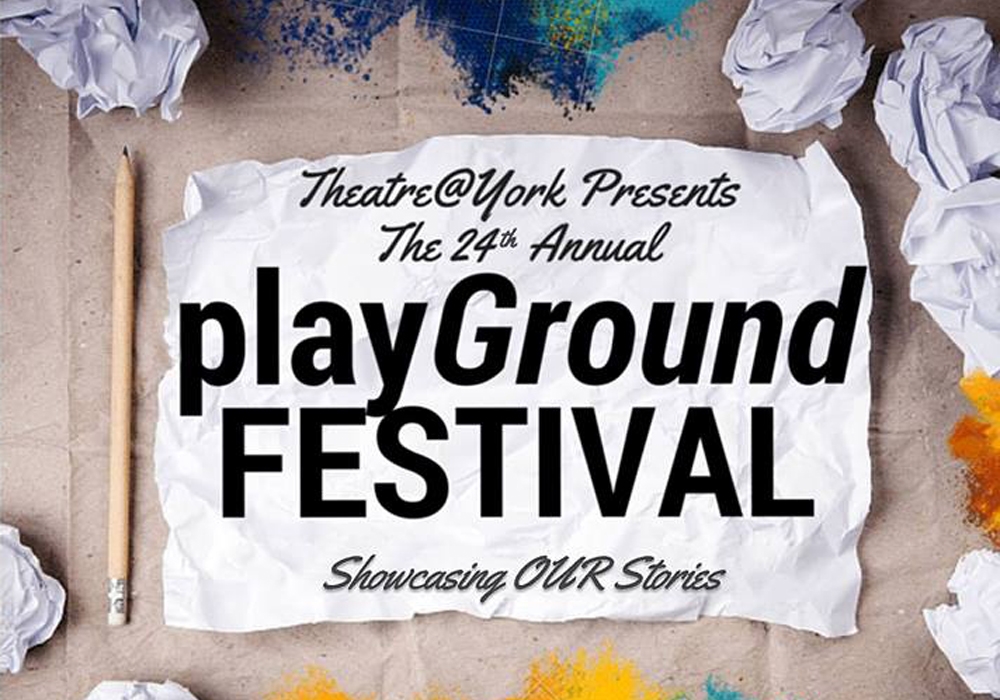You are bored. It’s a Friday night and all your friends are busy with their actual lives. You start to write. You’re not Ernest Hemingway or Jane Austen, but you’re pretty good. Actually, you really like what is being written down. Wait a minute, this could actually turn into something.
Two weeks later, that Friday night writing session turns into an obsessive writing binge that has seen seven re-writes and three friendly suggestions from your mom. You come out with a play. You like yourself a little more than you did two weeks ago.
Gasp.
You run into a problem: how the hell would you ever put this story on its feet? If only you had access to a work setting. What about people who are willing to work multiple days a week for free? That’s where playGround comes in.
For 24 years, playGround has been a platform for students of all majors to display their hard work and creativity in a safe, accepting space. Plays of all sorts have seen life at York’s Joseph G. Green Theatre, ranging from dramas, to comedies, to miming, to dance shows, and beyond. Each play, ranging around 15 minutes each, is seen one after another in two different series in February. These plays, along with the festival itself, are completely student-run and student-made. Every costume, sound effect, prop, light, and line has been put together by groups of students wanting to have their voices heard. Indeed countless writers, designers, actors, and technicians have seen their first work on the playGround stage.
But it hasn’t always been this way.
24 years ago, playGround saw its inception after the dissolve of an earlier festival within the Department of Theatre. The festival was founded by current playwriting and new dramaturgy professor Judith Rudakoff with the intention of developing writing and showcasing works-in-progress. With a strong emphasis on writing, it was necessary that all production values were stripped.
“This name suggested that the festival was a place to experiment, explore, ‘play’ around with new ideas, at the ground level,” Rudakoff remarks.
“The goal was to offer writers the chance to see their work in front of a general public, to give them a sense of what stages in the process lay beyond. Without the help of production values, the writing would be what the audience would engage with.”
Eventually, as the festival aged, students began to look at playGround as a place of production development, giving them the opportunity to make bigger, more elaborate plays. When speaking on this evolution, Rudakoff recalled the integration of different aspects of theatre in the festival as the years went on. “The major difference is that production values have gradually been re-instated, so that the festival now serves playwrights, designers, directors, and other artistic interpreters.”
“While in recent years, as dramaturgs have been part of the artistic directorate, there has been a return to the notion of staged readings and/or early stage work-in-process being included in the event. The primary festival is now essentially a fringe-style curated play showcase.”
In recent years, separate events centred on playwriting have prospered in the department along with playGround, such as The Ashley Plays and Telling Tales Out of School.
Today, the festival is promoted as entirely student-run. “This has been a positive evolution over the years: from being a faculty initiative with student involvement, to a student-run faculty-supervised event, to now being a fully independent student-run festival,” adds Rudakoff.
This year, the festival features a wide spectrum of exciting productions, including a drama about the real life clown-turned-murderer, John Wayne Gacy, a love story between two mimes, a playful movement tale of chocolate consumption, and an experimental piece about overcoming one’s fears.
The task of the artistic directors has been far from easy. “Our biggest challenge this year has been trying to toe the line between tradition and leaving our own mark on the playGround Festival,” says co-artistic director Elise LaCroix. “We created a unique mandate with a focus on telling our own stories and have created opportunities like the Development Workshop to bring students together as a community to help each other develop work, and as individual artists.”
Unsurprisingly, they strongly urge York students and faculty to see the annual show.
“People should see playGround because it is a chance to see what York theatre students are really thinking,” says co-artistic director Megan Apa.
“They’ve been given the chance to experiment and play, and it’s helped them make some really amazing pieces.”
So, there you have it. Six plays per series, each about 15 minutes, and all of them worth your time. If you have 90 minutes to spare between February 9 and 12 and are itching to see new, exciting theatre at York, playGround will not disappoint.
Alexander Colle, Contributor
Featured image courtesy of AMPD, York University


